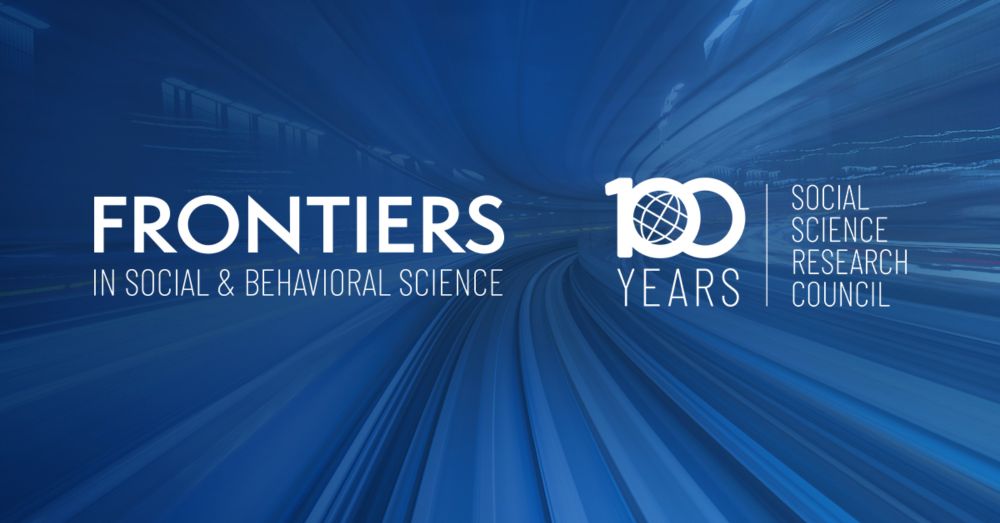
Each month, Frontiers in Social & Behavioral Science celebrates new work in our founding associations' flagship journals.
Read all of the featured articles here:
www.ssrc.org/frontiers/
@ssrc.org.bsky.social
The Social Science Research Council is an independent nonprofit that for 100 years has mobilized social & behavioral science for global policy impact. ssrc.org

Each month, Frontiers in Social & Behavioral Science celebrates new work in our founding associations' flagship journals.
Read all of the featured articles here:
www.ssrc.org/frontiers/
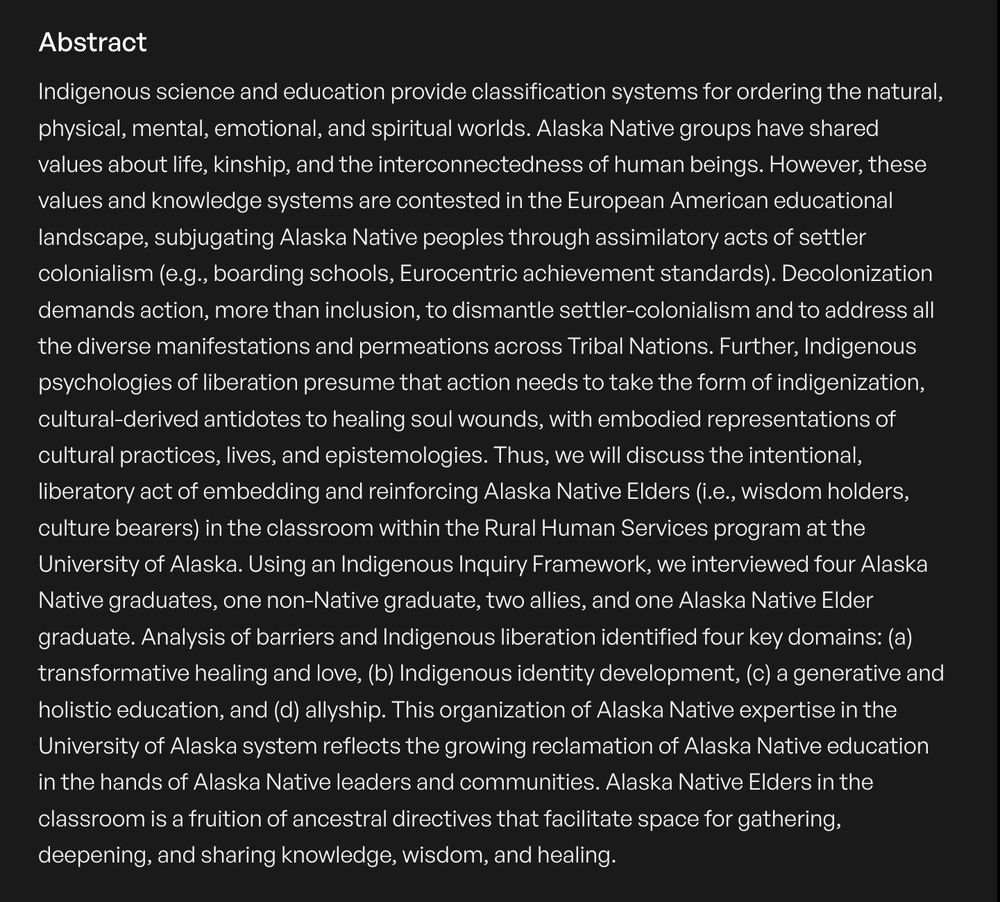
Indigenous science and education provide classification systems for ordering the natural, physical, mental, emotional, and spiritual worlds. Alaska Native groups have shared values about life, kinship, and the interconnectedness of human beings. However, these values and knowledge systems are contested in the European American educational landscape, subjugating Alaska Native peoples through assimilatory acts of settler colonialism (e.g., boarding schools, Eurocentric achievement standards). Decolonization demands action, more than inclusion, to dismantle settler-colonialism and to address all the diverse manifestations and permeations across Tribal Nations. Further, Indigenous psychologies of liberation presume that action needs to take the form of indigenization, cultural-derived antidotes to healing soul wounds, with embodied representations of cultural practices, lives, and epistemologies. Thus, we will discuss the intentional, liberatory act of embedding and reinforcing Alaska Native Elders (i.e., wisdom holders, culture bearers) in the classroom within the Rural Human Services program at the University of Alaska. Using an Indigenous Inquiry Framework, we interviewed four Alaska Native graduates, one non-Native graduate, two allies, and one Alaska Native Elder graduate. Analysis of barriers and Indigenous liberation identified four key domains: (a) transformative healing and love, (b) Indigenous identity development, (c) a generative and holistic education, and (d) allyship. This organization of Alaska Native expertise in the University of Alaska system reflects the growing reclamation of Alaska Native education in the hands of Alaska Native leaders and communities. Alaska Native Elders in the classroom is a fruition of ancestral directives that facilitate space for gathering, deepening, and sharing knowledge, wisdom, and healing.
In the APA's American Psychologist, a study by Maria C. Crouch, @lvnryt.bsky.social, and Nyché T. Andrew documents the effects of embedding Alaska Native elders into classrooms in the Rural Health Services program at the University of Alaska.
Read more: psycnet.apa.org/record/2026-...
I’m delighted to be featured in the SSRC’s latest issue of Frontiers in Social and Behavioral Science. Working on my article made me rethink of opium not as a social “vice” but as a resource for managing epidemic risk, explaining its prevalence on the high seas and the Chinese coolie trade.
29.07.2025 05:09 — 👍 1 🔁 1 💬 0 📌 0
Each month, Frontiers in Social & Behavioral Science celebrates new work in our founding associations' flagship journals.
Read all of the featured articles here:
www.ssrc.org/frontiers/
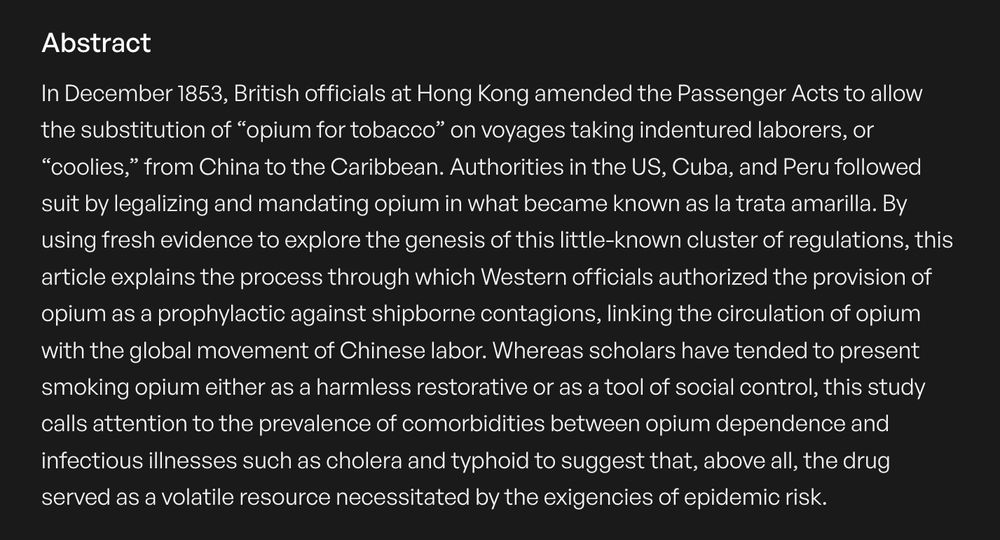
In December 1853, British officials at Hong Kong amended the Passenger Acts to allow the substitution of “opium for tobacco” on voyages taking indentured laborers, or “coolies,” from China to the Caribbean. Authorities in the US, Cuba, and Peru followed suit by legalizing and mandating opium in what became known as la trata amarilla. By using fresh evidence to explore the genesis of this little-known cluster of regulations, this article explains the process through which Western officials authorized the provision of opium as a prophylactic against shipborne contagions, linking the circulation of opium with the global movement of Chinese labor. Whereas scholars have tended to present smoking opium either as a harmless restorative or as a tool of social control, this study calls attention to the prevalence of comorbidities between opium dependence and infectious illnesses such as cholera and typhoid to suggest that, above all, the drug served as a volatile resource necessitated by the exigencies of epidemic risk.
In @historians.org American Historical Review, a study by Alastair Su @suyh.bsky.social explores the use of opium as a preventative measure against disease during the transport of Chinese indentured laborers in the mid-19th century.
Read more: academic.oup.com/ahr/article-...

Featured program Next Generation Social Sciences in Africa fellowships (funded by @carnegiecorp.bsky.social) support doctoral students in Africa as they explore, develop, and evaluate innovative solutions to local challenges.
Learn more:
www.ssrc.org/programs/nex...
With over a century of experience, the SSRC partners with funders to support research that advances knowledge, informs policy, and shapes the public conversation.
Learn more about our grants and fellowships:
www.ssrc.org/how-we-work/...
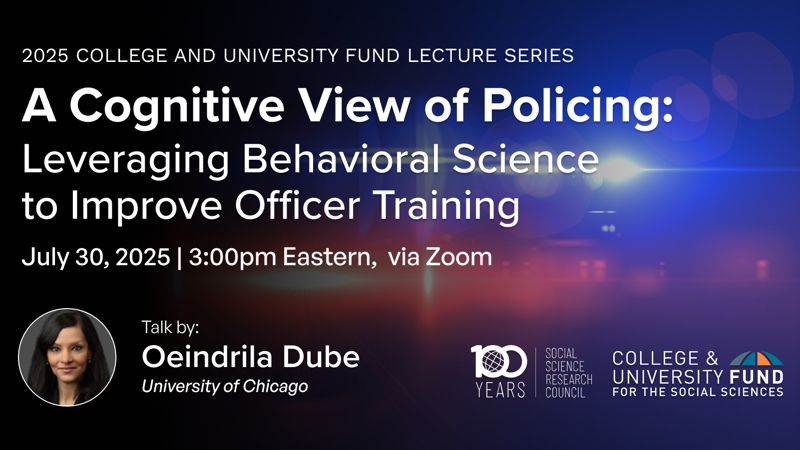
Next Wednesday, Oeindrila Dube will give our next CUF lecture on the cognitive factors of policing and leveraging behavioral science for officer training.
Register now: events.zoom.us/ev/Aq5UjHJwH...

Each month, Frontiers in Social & Behavioral Science celebrates new work in our founding associations' flagship journals.
Read all of the featured articles here:
www.ssrc.org/frontiers/
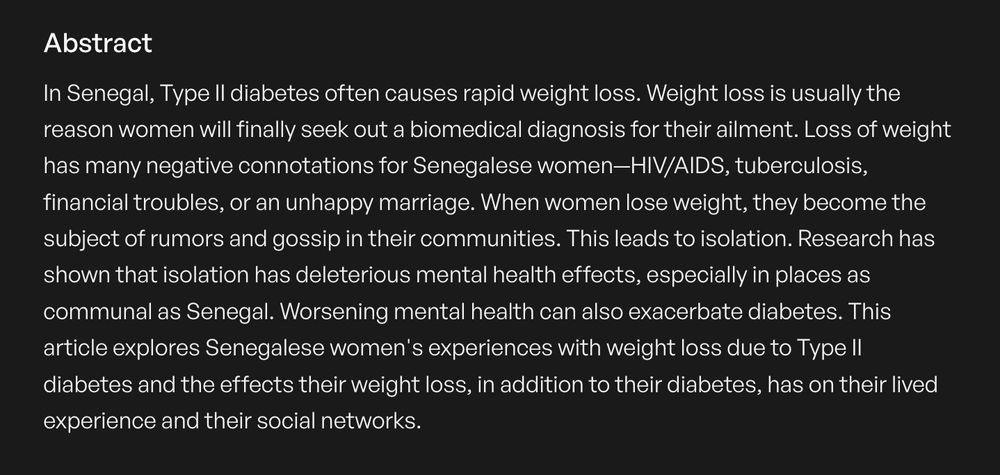
In Senegal, Type II diabetes often causes rapid weight loss. Weight loss is usually the reason women will finally seek out a biomedical diagnosis for their ailment. Loss of weight has many negative connotations for Senegalese women—HIV/AIDS, tuberculosis, financial troubles, or an unhappy marriage. When women lose weight, they become the subject of rumors and gossip in their communities. This leads to isolation. Research has shown that isolation has deleterious mental health effects, especially in places as communal as Senegal. Worsening mental health can also exacerbate diabetes. This article explores Senegalese women's experiences with weight loss due to Type II diabetes and the effects their weight loss, in addition to their diabetes, has on their lived experience and their social networks.
In @amanthro.bsky.social, Emma Nelson Bunkley finds that in Senegal, women with Type II diabetes combat social stigma from weight loss that negatively affects their physical health and community participation.
Read more: anthrosource.onlinelibrary.wiley.com/doi/10.1111/...

Each month, Frontiers in Social & Behavioral Science celebrates new work in our founding associations' flagship journals.
Read all of the featured articles here:
www.ssrc.org/frontiers/
Read more at the link below:
www.tandfonline.com/doi/full/10....
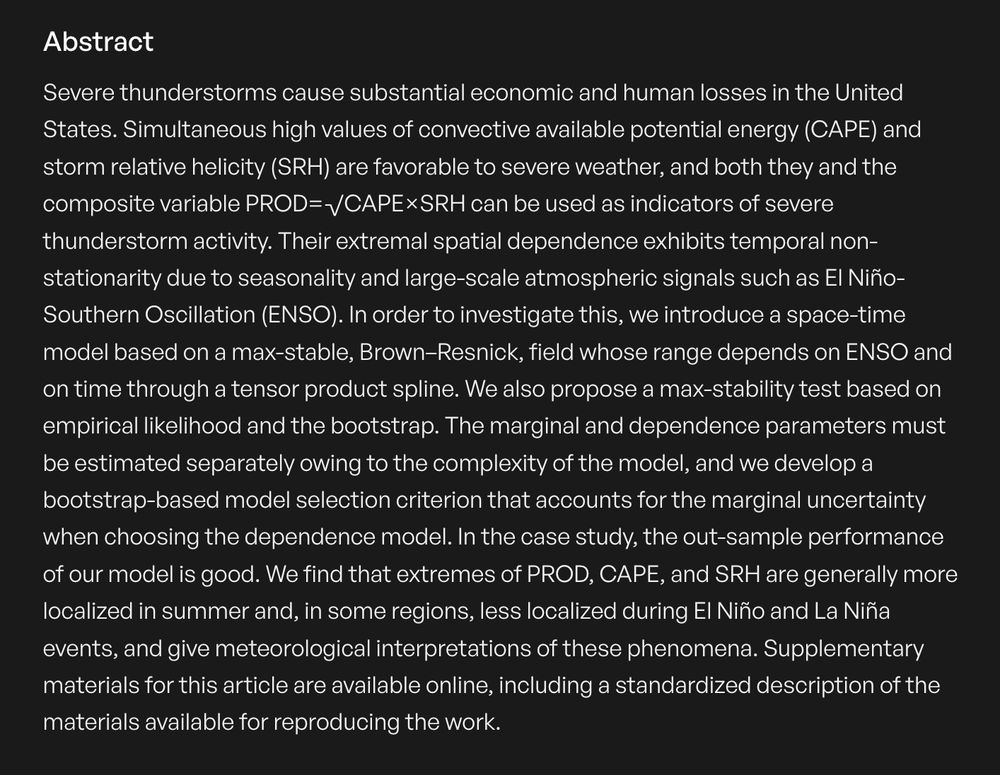
Severe thunderstorms cause substantial economic and human losses in the United States. Simultaneous high values of convective available potential energy (CAPE) and storm relative helicity (SRH) are favorable to severe weather, and both they and the composite variable PROD=√CAPE×SRH can be used as indicators of severe thunderstorm activity. Their extremal spatial dependence exhibits temporal non-stationarity due to seasonality and large-scale atmospheric signals such as El Niño-Southern Oscillation (ENSO). In order to investigate this, we introduce a space-time model based on a max-stable, Brown–Resnick, field whose range depends on ENSO and on time through a tensor product spline. We also propose a max-stability test based on empirical likelihood and the bootstrap. The marginal and dependence parameters must be estimated separately owing to the complexity of the model, and we develop a bootstrap-based model selection criterion that accounts for the marginal uncertainty when choosing the dependence model. In the case study, the out-sample performance of our model is good. We find that extremes of PROD, CAPE, and SRH are generally more localized in summer and, in some regions, less localized during El Niño and La Niña events, and give meteorological interpretations of these phenomena. Supplementary materials for this article are available online, including a standardized description of the materials available for reproducing the work.
In @amstatnews.bsky.social, a statistical model is developed by Jonathan Koh, Erwan Koch, and Anthony C. Davison to analyze how severe thunderstorm indicators vary across space and time in the U.S., especially under the influence of seasonal changes and El Niño events.
17.07.2025 18:46 — 👍 2 🔁 2 💬 1 📌 0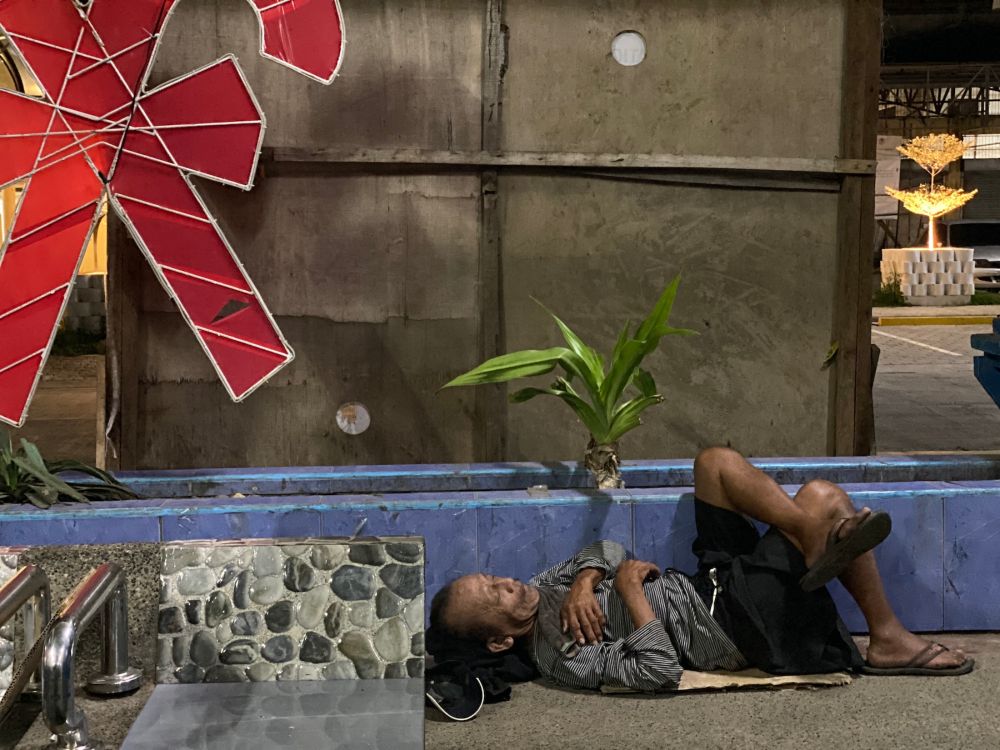
Jefferson Cuadra writes that his photo “forces us to confront the uncomfortable realities of spatial injustice, the commodification of public spaces, and the lived experiences of those displaced within them.”
Read more: racheltanurmemorialprize.ssrc.org/portfolios/d...
Learn about this @ssrc.org @sloanfoundation.bsky.social initiative to provide financial support for societally valuable economics research that was formerly funded by the NSF. The application deadline is rolling. Grantseekers should apply ASAP!
14.07.2025 19:31 — 👍 4 🔁 2 💬 0 📌 0
Each month, Frontiers in Social & Behavioral Science celebrates new work in our founding associations' flagship journals.
Read all of the featured articles here:
www.ssrc.org/frontiers/
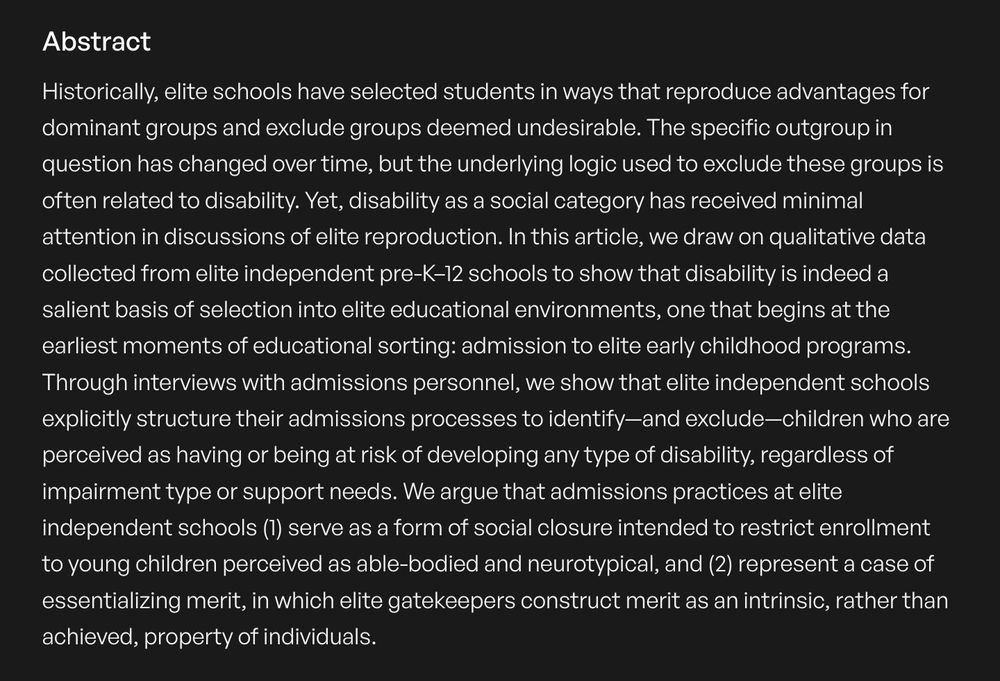
Historically, elite schools have selected students in ways that reproduce advantages for dominant groups and exclude groups deemed undesirable. The specific outgroup in question has changed over time, but the underlying logic used to exclude these groups is often related to disability. Yet, disability as a social category has received minimal attention in discussions of elite reproduction. In this article, we draw on qualitative data collected from elite independent pre-K–12 schools to show that disability is indeed a salient basis of selection into elite educational environments, one that begins at the earliest moments of educational sorting: admission to elite early childhood programs. Through interviews with admissions personnel, we show that elite independent schools explicitly structure their admissions processes to identify—and exclude—children who are perceived as having or being at risk of developing any type of disability, regardless of impairment type or support needs. We argue that admissions practices at elite independent schools (1) serve as a form of social closure intended to restrict enrollment to young children perceived as able-bodied and neurotypical, and (2) represent a case of essentializing merit, in which elite gatekeepers construct merit as an intrinsic, rather than achieved, property of individuals.
In @asanews.bsky.social ASR, @larivera.bsky.social and @estelabdiaz.bsky.social use qualitative data from elite independent pre K-12 schools to find that admissions processes are structured to exclude applicants at risk of disabilities.
Read more: journals.sagepub.com/doi/abs/10.1...

Marie, a 26-year-old Luritja woman, uses a payphone, late at night, to call her husband in prison.
Jenae Carpenter, the 2025 Rachel Tanur Memorial Second Prize winner, studies the effects of penal power on Luritja people’s lives in central Australia, and comments on the intimate relationships visual ethnographers build with their subjects.
Read more: bit.ly/4nHWIQZ

Each month, Frontiers in Social & Behavioral Science celebrates new work in our founding associations' flagship journals.
Read all of the featured articles here:
www.ssrc.org/frontiers/
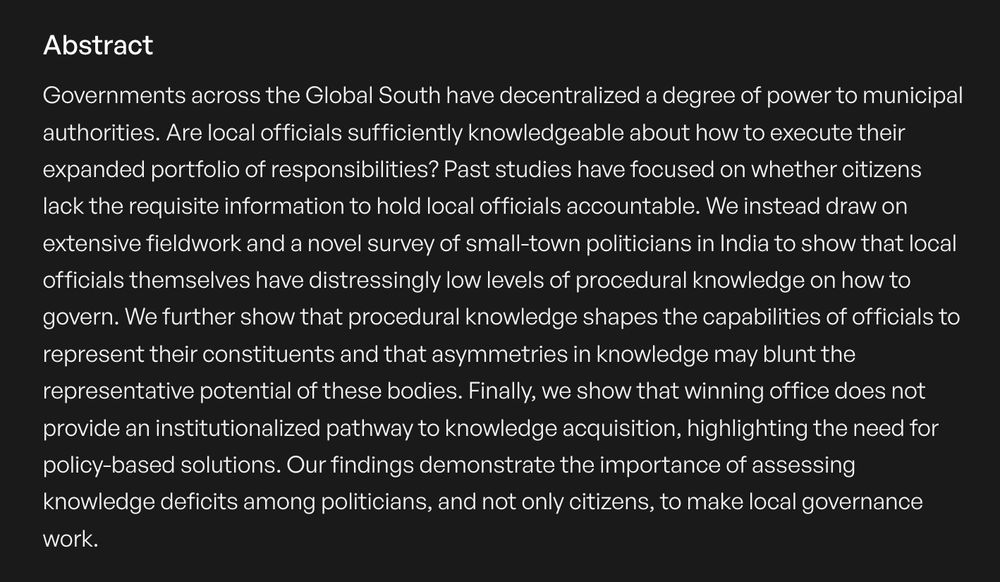
Governments across the Global South have decentralized a degree of power to municipal authorities. Are local officials sufficiently knowledgeable about how to execute their expanded portfolio of responsibilities? Past studies have focused on whether citizens lack the requisite information to hold local officials accountable. We instead draw on extensive fieldwork and a novel survey of small-town politicians in India to show that local officials themselves have distressingly low levels of procedural knowledge on how to govern. We further show that procedural knowledge shapes the capabilities of officials to represent their constituents and that asymmetries in knowledge may blunt the representative potential of these bodies. Finally, we show that winning office does not provide an institutionalized pathway to knowledge acquisition, highlighting the need for policy-based solutions. Our findings demonstrate the importance of assessing knowledge deficits among politicians, and not only citizens, to make local governance work.
In @apsrjournal.bsky.social, Adam Auerbach, Shikhar Singh, and Tariq Thachil surveyed small town politicians in India and found that local government officials lack procedural knowledge on how to govern.
www.cambridge.org/core/journal...

This piece published by @wallacefoundation.bsky.social highlights the work of two Fellows supported by the SSRC’s Arts Research in Communities program: Raquel Jimenez with Pregones Theater and @atboston.bsky.social with the Laundromat Project. Learn more:
wallacefoundation.org/resource/art...
We welcome other funders to contribute to the Research Rescue Fund, and encourage funders to support canceled or suspended research in disciplines other than economics.
10.07.2025 19:41 — 👍 1 🔁 0 💬 0 📌 0The fund will provide financial support for societally valuable economics research that was formerly funded by the NSF. Funds are limited, so grantseekers should apply as soon as possible.
Apply here: ssrc.secure-platform.com/a/solicitati...
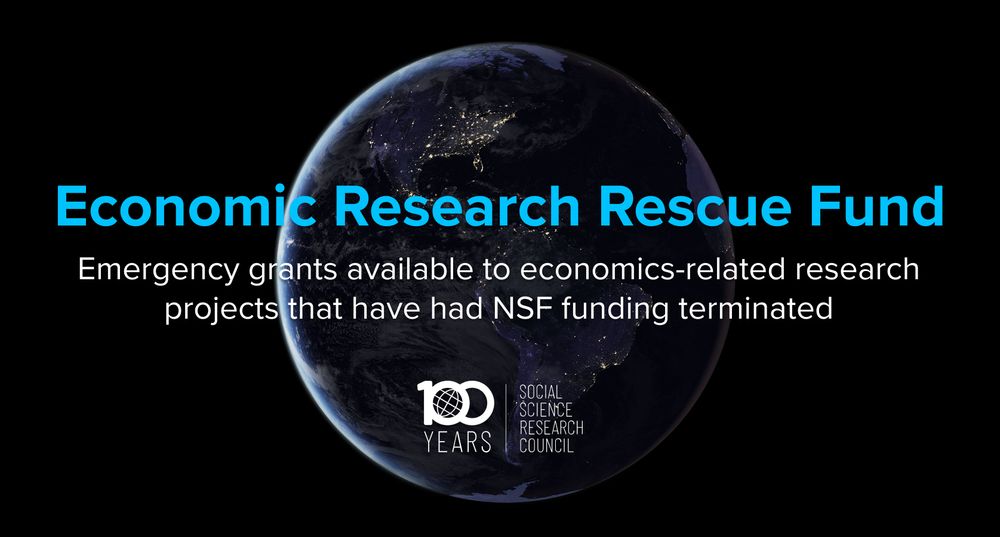
Economic Research Rescue Fund - Emergency grants available to economics-related research projects that have had NSF funding terminated
In recent months the NSF has significantly reduced research funding. We're partnering with @sloanfoundation.bsky.social to launch a Research Rescue Fund, a citizen-led initiative to rescue societally valuable economics research.
Learn more: www.ssrc.org/programs/eco...
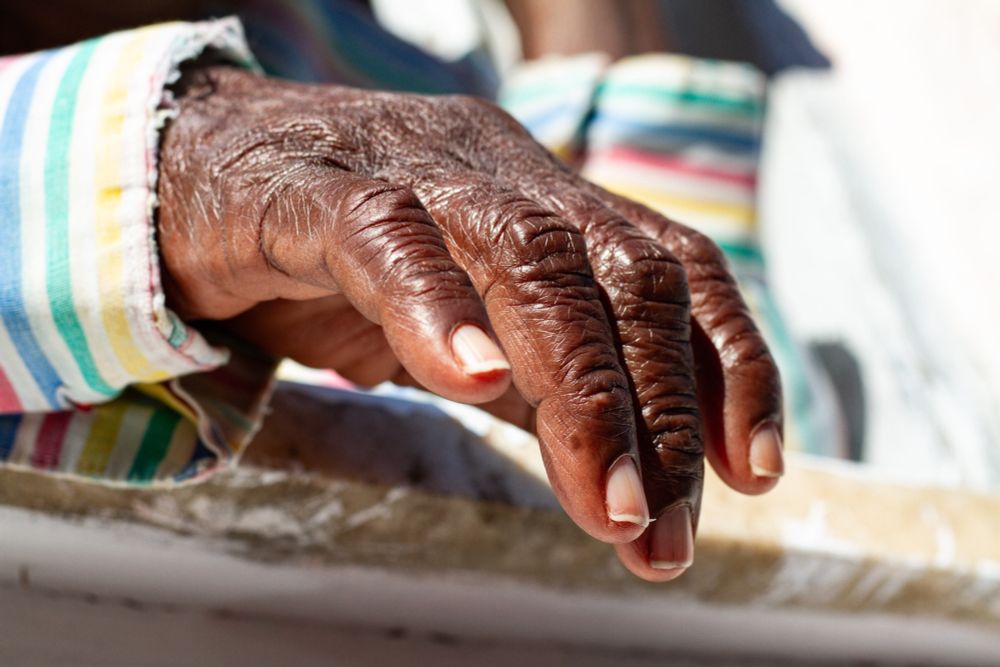
The photo that won the 2025 Rachel Tanur Memorial First Prize “captures the weathered hand of the oldest woman in the quilombo community of Cachoeira, Brazil,” writes winner Stephanie Fanfan Simbo.
Read more in Simbo’s photo essay:
racheltanurmemorialprize.ssrc.org/portfolios/l...

Each month, Frontiers in Social & Behavioral Science celebrates new work in our founding associations' flagship journals.
Read all of the featured articles here:
www.ssrc.org/frontiers/
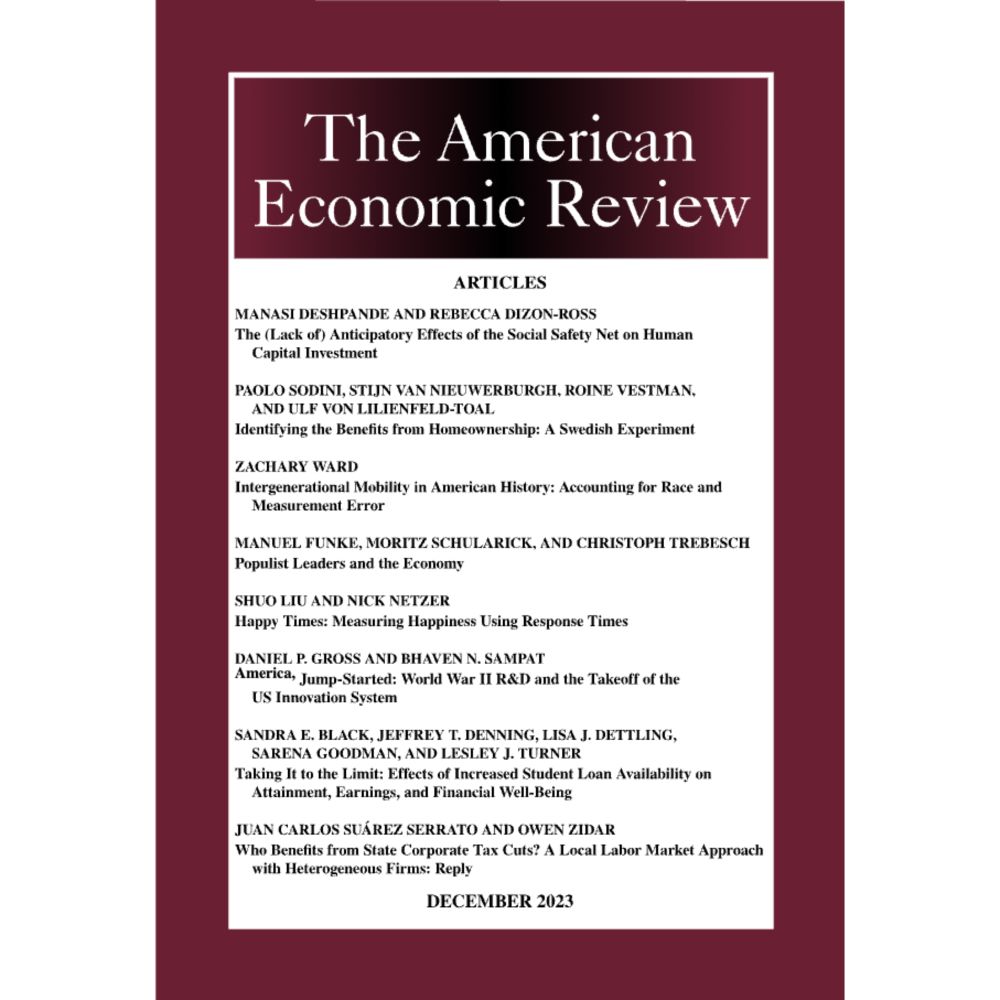
Read more at the link below:
www.aeaweb.org/articles?id=...
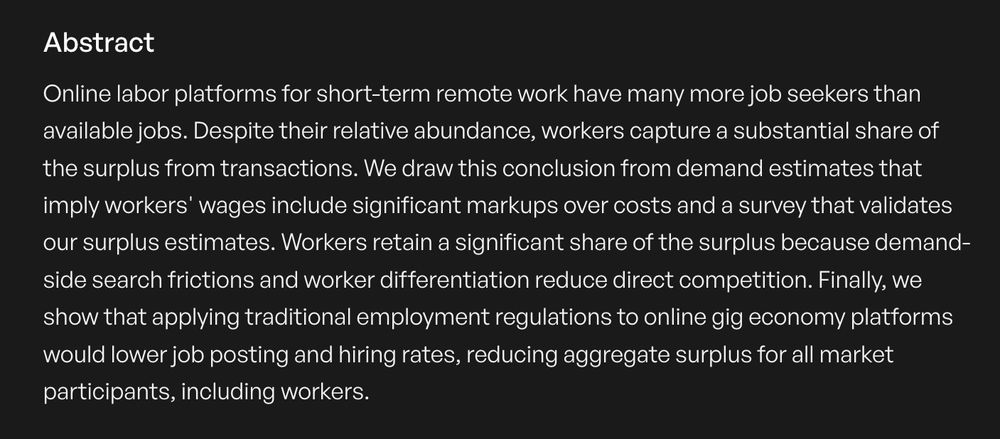
Online labor platforms for short-term remote work have many more job seekers than available jobs. Despite their relative abundance, workers capture a substantial share of the surplus from transactions. We draw this conclusion from demand estimates that imply workers' wages include significant markups over costs and a survey that validates our surplus estimates. Workers retain a significant share of the surplus because demand-side search frictions and worker differentiation reduce direct competition. Finally, we show that applying traditional employment regulations to online gig economy platforms would lower job posting and hiring rates, reducing aggregate surplus for all market participants, including workers.
In @aeajournals.bsky.social AER, Christopher T. Stanton and Catherine Thomas reveal that online platforms for short-term remote work that do not have to comply with traditional employment regulations benefit all market participants, and especially workers.
07.07.2025 19:48 — 👍 1 🔁 0 💬 1 📌 0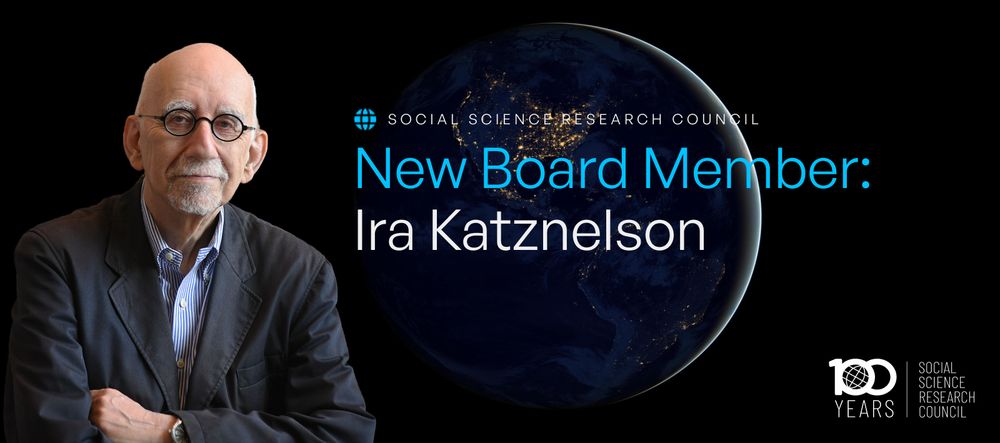
New Board Member: Ira Katznelson
We're pleased to welcome Ira Katznelson, Ruggles Professor of Political Science and History @columbiauniversity.bsky.social, to the SSRC Board of Directors. Katznelson is a former president of both the American Political Science Association and the Social Science Research Council.
01.07.2025 16:24 — 👍 0 🔁 0 💬 0 📌 0
Read more about our Frontiers selections: www.ssrc.org/frontiers/
30.06.2025 18:57 — 👍 0 🔁 0 💬 0 📌 0